- Home
- Posie Graeme-Evans
The Exiled Page 17
The Exiled Read online
Page 17
Gathering her skirts in one hand, Anne breathed deeply and, having steadied herself, began to ascend the shallow stone steps in front of her.
At the top, a broad path led straight to the hall, well lit by lines of liveried servants each side holding flambeaux. It was only at the last step that Anne saw the path was empty in front of her, all the other guests either already inside the hall, or still climbing the water steps behind her.
She would enter the hall alone. That would cause scandal, she knew, as she’d been asked by several other guests to join their parties — and had refused. Now, however, as the moment could not be denied, her courage almost failed for there was no escaping the attention such an act would bring.
The light in the hall was dazzling and in one sense, her entry was badly timed because as she stepped through the rose-glass doors, trumpets sounded so loudly, so suddenly, she stumbled from surprise.
Around her, fellow guests turned towards the high dais set at the far end of the great tented space. They breathed as one — a quick inhale, followed by a long, long sigh, for the duke and his new duchess had arrived. With the collective whisper of expensive material being gathered up in jewelled hands, the entire company knelt.
The trumpets sounded once, twice, three times more, and Edward of England and his mother processed into the hall, to be greeted by their host and his duchess, sister and daughter no more, but co-ruler of her own domain.
For a moment, Anne, dazzled by the sight, stood alone in the doorway, in clear sight of the dais to which the royal party was processing.
Edward, as the chief and most honoured guest at the feast, bowed graciously to left and right as he escorted his mother to her own ducal throne behind the high table, but then he paused, his eyes fixed on the open doorway where Anne found herself trapped: Anne, standing alone in her dress of mutable silk.
Gracefully, unhurriedly, she too sank to her knees on the painted tiles joining the other guests. But her heart was hammering — he was wearing the jewels she’d thrown him.
The court, the hall, was a frozen tableau, then Edward bowed expressly to her, Anne graciously inclined her head, and the king moved on with Duchess Cicely.
A great feast is a hive of gossip — elaborate manners and courtly gestures are merely the pretty garments on top of the flesh and bone of expectation and speculation. So it was here. Many eyes had noted Edward’s expression when he saw Anne de Bohun, amongst them Duke Charles. And many had seen too that the skein of pearls and emeralds thrown to him by this same English lady was slung around his shoulders, in place of the more usual gold collar of state. Where was William Caxton? Had he seen what had come to pass?
But now the bride was seated beneath her own Cloth of Estate, with the duke seated at her right hand, and Edward on his sister’s left. The guests all rose quickly from their knees as the silver trumpets brayed once more, and hurried to their allocated places whilst servers processed the first spectacular dishes to each long board.
Whole baked peacocks redressed in their plumage, gilded raised pies in the shapes of mythical animals, fricasées and ragouts of spiced porpoise, and venison, crane, widgeon, teal, tench and pike.
Duke Charles, as aware of Anne’s spectacular entrance as any man in the room, flicked a glance at Edward. How much did his guest know of what Caxton had told him?
The king had chosen to honour Anne by wearing her jewels. Yes, Charles had heard the gossip, too, though he’d not seen her throw them. So, perhaps, there was truth in Caxton’s story about this pair of remarkably handsome people — but then his bride smiled at him, charmingly and shyly, and the duke abandoned his uneasy thoughts and concentrated on his new duchess. Time enough for politics later.
After the busy chaos of being seated, Anne, with consummate good manners, applied herself to conversation with her neighbours, apparently unconscious of the interest that one glance from Edward had engendered amongst the other wedding guests.
Fierce joy burned her; Edward was glorious still.
And they were Edward’s thoughts too when he gazed down into the hall, elaborately casual. Yes, it was Anne; flesh and blood, and beautiful, more beautiful; remote but real.
But she would not look at him. Well then, he would have to change that calm detachment. The dangerous heat in his blood, the churning elation in the pit of his belly conveyed utter certainty; there was much to be said and done between them again, whether she was prepared to acknowledge him or not.
William Caxton, however, on the other side of the hall at a board filled with fellow members of the English Guild of Merchants, was deeply uneasy. He had nearly choked when Anne entered the hall and Edward bowed to her. In her simply cut, peacock-silk dress she was impossible to miss amongst the sea of red velvet, black velvet and cloth of gold. His own wife was trussed into a gown of heavy burgundy figured-damask, in complement to the duke, and was nearly scarlet with the heat, sweat dripping from her chin into ample cleavage as she tried to sustain the weight of her monstrously padded, jewelled headdress.
And it did not please Maud when she saw her husband gaze at Anne: God damn that whore for her cool poise. She wasn’t even slightly flushed, though she must have known that nearly every male eye in that great hall was pulled to her as if by a lode stone by the un-virtue of that flimsy dress!
Anne must have felt the heat of Maud’s wrath, for at that moment she glanced up and saw the Caxtons. Gravely she bowed to them, then laughingly answered her left-hand neighbour, a Flemish knight of excellent birth who had only just lost a wife and was looking to replace her. ‘No, Sir Piotr, I do not think of marriage. My trading interests are husband enough for me.’
Sir Piotr snorted. ‘Ah, Lady, that can only mean you do not understand. The right husband now, he could cause you to think differently.’ Greatly daring, he allowed one of his hands to touch hers, touch and linger, as he reached across to a dish of green-baked larks with gilded sandalwood powder scattered across their surface. They were sharing a trencher, Anne and he, but theirs was no slab of bread — it was a massive silver tray, a most fashionable and extravagant addition to the table for each pair of guests.
Without fuss, Anne slid her hand from beneath the knight’s as she contrived to signal to one of the servitors. ‘Sir Piotr, let me assist you with these larks before they can fly from you.’
‘Lady, songbirds need freedom, we all know that. But they can live happily in a cage — if it is of the right sort. It is said they reserve their sweetest music for their owners.’
Anne smiled graciously. ‘How fortunate you are, Sir Knight. Your knowledge of birds is remarkable. However, I think it a shame — caged birds make me sad. I love to see them fly and prize their captive songs less than you.’
She turned politely in response to a sally from her other neighbour, leaving the knight only a little dashed. Sitting next to Anne was plainly the work of destiny, he was convinced of it. He would not let such a chance go to waste!
Unseen by all but the duke himself, Edward, at the high table, narrowed his eyes. That clumsy oaf who sat by Anne was ogling the girl, even daring to touch her hand! She was a jewel, a glinting, supremely precious jewel in a setting of base metal. He was still getting used to her presence, so close he could almost hear what she was saying to the idiots who sat beside her at the board below the high table. He would have to work hard, tonight, to be properly attentive to the festival, to play his part, for if he allowed himself, it would be noticed he had eyes for nothing and no one but the girl dressed in peacock silk.
With an effort, he tore his gaze away from Anne to see, with pleasure, that his erstwhile so rebellious little sister was nearly speechless and slightly dazed sitting next to Duke Charles.
Her manners were exemplary, of course, but Edward knew Margaret well. Colour glowed high on her cheeks and when Duke Charles turned to address her, Edward could see his sister making every effort to be graceful and pleasing to her new husband. Duke Charles’ physical presence was formidable; Edward had see
n its effect on women before, many times.
Yet it was a strange sight watching Margaret flirting with the man she’d been determined to despise. She looked up and caught Edward’s glance, even threw him a slightly defiant smile as if to say, well, so perhaps you were right ...
He smiled in return and shook his head. Silly girl — trust your brother. She understood and shrugged, making a little moue. And then turned back and smiled brilliantly at her duke. Who raised her hand and kissed it, lingeringly. Paralysed, she left it within his grasp, drowning in his dark, brilliant eyes.
Below the high table, Anne picked up the byplay between the new bride and groom and her gut contracted. To see the dawning of passion so clearly reflected on both faces was to remind her of the past. Images of the time she had spent in Edward’s arms flashed behind her eyes unbidden. His mouth, the hardness of his arms, his strength. The beauty of his body.
Edward’s face swam into focus. He was gazing down at her, eyes boring into her own as he loosened the first few buttons of his jacket, just as if he were feeling the heat. Quickly Anne dropped her eyes, her blood fizzing like the Moorish sherbet even now foaming in the precious white glass beaker she was holding. Duke Charles rose gracefully to his feet, breaking the moment as horns, viols and tabors struck up to signal the end of the first part of the feast.
Bowing firstly to his bride, and then, more deeply still, to his honoured guest the King of England, and his mother Duchess Cicely, the duke cleared his throat to speak.
‘Dear friends, I have waited for this day!’ The new husband was beaming as he looked out over his magnificently dressed subjects. ‘I am a lucky man for God has seen fit to bestow on me the sister of my dearest friend,’ he bowed again to Edward, ‘the most noble, the most gracious, the most beautiful Princess Margaret of England, to be my duchess.’
Now it was to his bride that he turned. ‘Dearest Lady, you are the living symbol of the precious unity which has always bound Burgundy and England. We welcome you to your city with love, and from this day I am your joyful and faithful servant in heart and in body; and as a loving champion and husband should, I will worship you all the days of my life, which I attest before this noble company here gathered. England and Burgundy are now joined for ever. Or will be, as soon as that can be arranged.’
There was a little gasp of shocked laughter at the boldness of his last words. Their duke was certainly well pleased in the choice of this, his new duchess; and plainly he meant to worship his new bride very thoroughly on their wedding night. Margaret herself looked down quickly out of suitable embarrassment but many remarked on the pleasure which flashed from her eyes at her husband’s words. This was to be a warm night in more ways than one.
Anne smiled, even laughed, as did her neighbours at the bride’s blushes, but it was hard not to feel wistful sorrow mixed with the pleasure of this celebration. The princess did not understand how lucky she was: she was adored by her new subjects and, it seemed, by her new husband. And he had acknowledged his feelings for her, and his delight in her person, in this most public way. Yet she, Anne, would never, could never, receive such an honourable declaration from the man she had not ceased to love.
Edward too had been stirred by the Duke’s speech with its frank reference to the physical pleasure he was impatient to enjoy. The duke and he shared a common, urgent desire to be done with the public part of the night so that the private might begin.
It took all Edward’s will not to look down at Anne again as he rose to his feet to respond to the duke’s graceful little speech on behalf of his sister, the bride.
‘Duke Charles, it is hot tonight plainly. I am warm, I swear; and from your looks it seems that you are also; why, even my sister, the duchess, seems right fevered. Perhaps prayers can cool that heat for she is most devout, your new duchess — she will not fail to match you in piety, prayer for worshipful prayer, of that I am certain.’ This time Margaret couldn’t help but giggle, and even her dignified mother was seen to smile.
Edward held up one hand to quell the delighted, rising babble. ‘I too see this marriage as a symbol of the joining between your state, Duke Charles and our own. A joining that is very precious to us.’ As the king bowed gracefully to his host he allowed his eyes to sweep the room, deliberately catching Anne’s glance in his own like a fowler netting a bird.
‘In this toast,’ Edward had raised his goblet filled with the richest wine from Duke Charles’s best vineyards, ‘we seek blessing on your marriage from God and his most Holy Mother, the patroness of this fair city. May the children of Burgundy multiply, may this noble state prosper and may the ties between us be ever deepened. We drink to you!’
‘We drink to you,’ was echoed around the great hall, and as the sweet wine slid down Anne’s throat she found herself looking up and, in that moment, the king raised his goblet to her, and very deliberately drank it to the lees.
The intensity of his look made Anne choke with shock on her own wine. Piotr, taking advantage of the moment, banged her delightedly on her back, briefly allowing his hand free range of her shoulders and spine. ‘Careful, Lady, burgundy can be very strong if you’re not used to it.’ He thought he was being gallant, but his grinning obviousness of purpose had the most unexpected effect on Anne. She laughed giddily. ‘Sir Piotr, it’s plainly not the wine I should be concerned about. The men of Burgundy are stronger. You nearly broke my back!’
Chapter Twenty-Five
It was time to put the bride to bed.
The feast, despite the best efforts of Duke Charles to hurry the ceremonial pace along, had wound its way well past midnight, but now, at last, the final course had been finished, with one last extravagant ‘subtlety’ — this time a gilded, marchpane model of Brugge with the bride and groom standing in the market square, waving to the assembled people of Brugge, complete with canals and all the principal buildings of the city — and Duke Charles rose to his feet.
‘My friends, since it is my wedding night, and the duchess’s, I’m sure you will understand if I thank you all for your attendance and wish you all a fair good night!’
‘And you, Your Grace! And you, Duchess.’ Delighted shouts and good-natured laughter rippled around the hall at the Duke’s impatience to be alone with his bride as an energetic measure struck up from the musicians. Quickly the guests sprang up from the boards as servants hurried to clear the trestles so that the hall was clear in a trice for the bride and groom to progress to their bridal suite together.
Some few lucky guests, as a special mark of favour from the duke, had been invited to witness the official bedding, and Anne was one of those. She could feel her heartbeat ramp higher as she accepted Sir Piotr’s help to stand from the long backless bench they had both been sitting on. Thinking this would guarantee him a moment’s more conversation with his charming dinner companion, the knight attempted to become her champion.
‘Lady Anne, since you have no member of your family to escort you, perhaps when the bridal party have departed, I can be permitted to accompany you to your home. For safety only, dear lady; the town will be rowdy tonight.’
Anne smiled at him and shook her head gently.
‘How kind you are, Sir Piotr. But I shall be here a little longer in the palace. And I have my own barge waiting, with my servants. They will see me safely home when the time comes.’
That dashed the knight’s confidence. He, himself, was not invited to witness the bedding. Lady Anne must be in high favour; yet another evidence of her potential value to his house. He decided to take the rebuff gracefully.
‘Ah, lady, you devastate me. But perhaps I may call upon you tomorrow so that I can, personally, assure myself that you are safe.’
It would be grossly impolite to reject the knight further, so with grave good manners Anne curtsied to him and he bowed deeply in return.
As she rose, Anne was astonished to see a much older man in front of her, Sir Piotr, but much, much older: fatter, red-faced and beaming, and beside him, a wom
an of about his own age who was laughing happily. Sir Piotr patted the woman’s hand affectionately as she gazed up at him and then ... the image was gone.
Sir Piotr, the young Sir Piotr, was smiling at Anne eagerly, unwilling to let her slip away. ‘Did you say something, mistress? I thought perhaps ...?’
Anne shook her head. ‘No, Sir Piotr. I wish you a good evening.’ And before he could speak further, she moved away, smiling, towards the back of the crowd which was arranging itself, with the help of the palace chamberlain and his people, so that a wide central corridor of space permitted the exit of the court party.
The duke and his new duchess processed through the crowd, bowing jubilantly right and left, followed by Edward, who had Duchess Cicely on his arm once more. Nearer and nearer they came to where Anne was standing as chosen members of the assembly fell in behind the duke and duchess on their way to the bedding. Soon Anne would join them and face the moment when she must meet with not only Edward, but his mother and his sister. And other members of the English court.
It had been two years since she had been one of Queen Elisabeth’s body servants, but Anne knew, though she was dressed in fine clothes, that she would be recognised. Her life, one way or another, would change from tonight. What she had once been would throw her back, for good or ill, into the world of the English court. And the English king.
Ribald shouting and lewd jokes preceded the slow passage of Duke Charles and his bride, sound so boomingly loud it had the percussive force of the sea hitting a gravel beach.
Anne, in the shadows beside the blue, silk-draped walls of the banqueting hall, was lapped and caught up in it so strongly it shook her body, and suddenly she was not in the hall but standing on a high cliff — and when she turned back she saw St Hilda’s great abbey, crouching above the cold, grey sea, far below.
Whitby, she was in Whitby again, but this time she was alone, cold and very frightened. She’d lost someone, someone dear to her. And when she looked down at herself, saw the blackened wood crucifix clutched in her hand, saw what she was wearing, she choked down a scream for she was dressed in the rough-spun robes of a postulant — a novice nun.

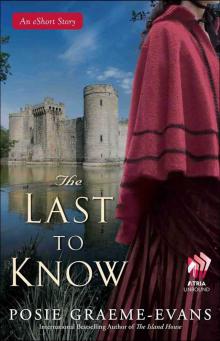 The Last to Know
The Last to Know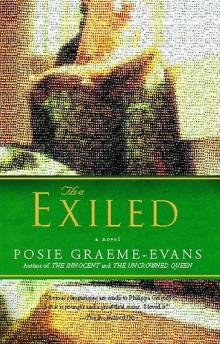 The Exiled
The Exiled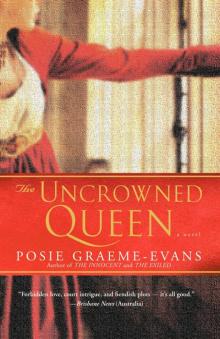 The Uncrowned Queen
The Uncrowned Queen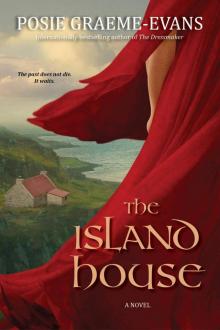 The Island House
The Island House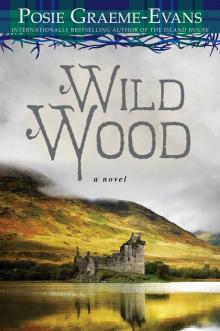 Wild Wood
Wild Wood